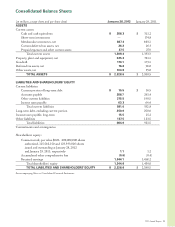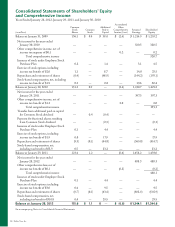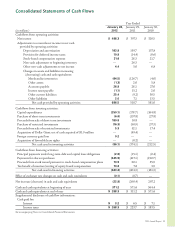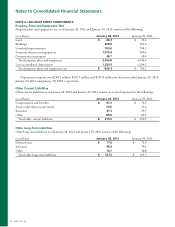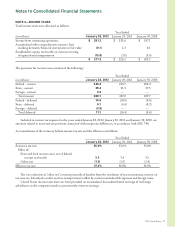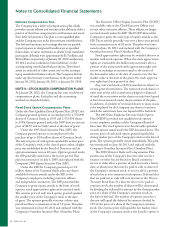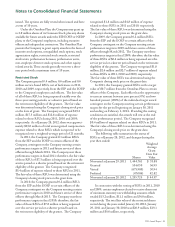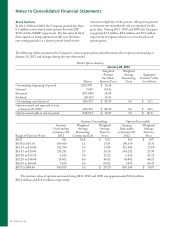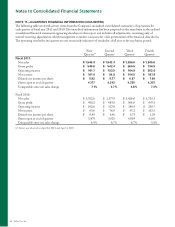Dollar Tree 2011 Annual Report Download - page 40
Download and view the complete annual report
Please find page 40 of the 2011 Dollar Tree annual report below. You can navigate through the pages in the report by either clicking on the pages listed below, or by using the keyword search tool below to find specific information within the annual report.
1RWHVWR&RQVROLGDWHG)LQDQFLDO6WDWHPHQWV
Deferred income taxes reflect the net tax effects of temporary differences between the carrying amounts of assets
and liabilities for financial reporting purposes and the amounts used for income tax purposes. Deferred tax assets and
liabilities are classified on the accompanying consolidated balance sheets based on the classification of the underlying
asset or liability. Significant components of the Company’s net deferred tax assets (liabilities) follow:
(in millions) January 28, 2012 January 29, 2011
Deferred tax assets:
Deferred rent $31.5 $ 31.4
Accrued expenses
31.4 25.4
Net operating losses and credit carryforwards
9.1
6.4
Accrued compensation expense
27.0
22.5
Other
1.5
1.9
Total deferred tax assets
100.5
87.6
Valuation allowance
(3.5)
(4.8)
Deferred tax assets, net
97.0
82.8
Deferred tax liabilities:
Property and equipment
(34.0)
(4.6)
Goodwill
(15.1)
(15.8)
Prepaid expenses
(0.4)
(3.8)
Inventory
(4.5)
(4.3)
Total deferred tax liabilities
(54.0)
(28.5)
Net deferred tax asset $ 43.0 $ 54.3
A valuation allowance of $3.5 million, net of federal
tax benefits, has been provided principally for certain
state credit carryforwards and net operating loss carryfor-
wards. In assessing the realizability of deferred tax assets,
the Company considers whether it is more likely than
not that some portion or all of the deferred taxes will not
be realized. Based upon the availability of carrybacks of
future deductible amounts to the past two years’ taxable
income and the Company’s projections for future taxable
income over the periods in which the deferred tax assets
are deductible, the Company believes it is more likely
than not the remaining existing deductible temporary
differences will reverse during periods in which carry-
backs are available or in which the Company generates
net taxable income.
e company is participating in the Internal Revenue
Service (“IRS”) Compliance Assurance Program (“CAP”)
for the 2011 fiscal year and has applied to participate for
fiscal year 2012. is program accelerates the examination
of key transactions with the goal of resolving any issues
before the tax return is filed. Our federal tax returns
have been examined and all issues have been settled
through our fiscal 2010 tax year. In addition, several
states completed their examination during the fiscal year.
In general, fiscal years 2008 and forward are within the
statute of limitations for state tax purposes. e statute of
limitations is still open prior to 2008 for some states.
ASC 740 prescribes a recognition threshold and
measurement attribute for a tax position taken or
expected to be taken in a tax return. Under the guidelines
of ASC 740, an entity should recognize a financial
statement benefit for a tax position if it determines that it
is more likely than not that the position will be sustained
upon examination.
38 Dollar Tree, Inc.



